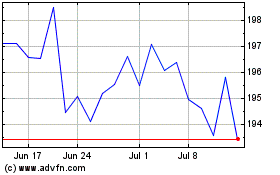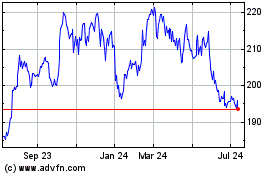Illinois Lawmakers To Reconsider CME-CBOE, Sears Deal Monday
December 06 2011 - 9:44PM
Dow Jones News
Illinois lawmakers will return to session Monday to consider a
series of tax breaks, hoping to head off departure of Chicago's
largest derivatives exchanges and a major retailer to other
states.
Only a week ago, the state House of Representatives
overwhelmingly rejected the measure, which would provide tax relief
to CME Group Inc. (CME), CBOE Holdings Inc. (CBOE) and Sears
Holdings Corp. (SHLD).
It isn't clear whether legislative leaders and Democratic
Governor Pat Quinn have reached agreement on how to present the
legislation to the General Assembly. It is possible lawmakers will
vote on each of the tax breaks individually, rather than grouped
together in a large package.
"It's a work in progress," Quinn's spokeswoman Brooke Anderson
said Tuesday night.
The Illinois Senate approved the bill with Quinn's backing only
hours before the House could muster only eight 'yes' votes.
Latest negotiations among the legislative leaders are taking
place with increased urgency.
A Sears spokesman said last week that it still intends to make a
decision about its headquarters site before the end of this year.
And, late last week, Indianapolis Mayor Greg Ballard visited CME's
Chicago offices to discuss with CME executives a "very competitive
offer."
Sears would benefit from renewal of a special taxing district
for its headquarters in the Chicago suburbs of Hoffman Estates,
where the retailer employs 6,100 people.
CME and options exchange CBOE would be taxed on 27.54% of all
electronic trades, which account for the vast majority of the
business performed at the exchanges. Currently, the exchanges pay
taxes on 100% of their electronic transactions, even though the
bulk of the trades are done outside of Illinois.
Tax breaks won't kick-in for CME and CBOE until the start of the
next fiscal year, which begins July 1 of next year.
The hang-up in the House appeared to be the amount of tax relief
that low-and-middle income workers would receive in the form of
earned income tax credits and personal exemptions.
Republicans argued that tax credits don't retain or create jobs,
however Gov. Quinn and other proponents contended that putting more
money in the hands of workers stimulates consumer demand.
CME and CBOE complained they have been unfairly harmed by the
state legislature's vote in January to raise the state's corporate
tax to 7%, from 4.8%.
For CME, the tax hike cost an extra $50 million per year, said
CME Chairman Terry Duffy.
CME has called Chicago its home for 163 years, and employs
approximately 2,000 Illinois employees. Duffy told a state House
committee earlier this month that it would relocate its electronic
trading systems and clearinghouse. Only the trading floors at
CME-owned Chicago Board of Trade, would remain. The open-outcry
pits represent less than 5% of CME's business, Duffy said.
-By Howard Packowitz, Dow Jones Newswires; 312-750-4132;
howard.packowitz@dowjones.com
CME (NASDAQ:CME)
Historical Stock Chart
From Jun 2024 to Jul 2024

CME (NASDAQ:CME)
Historical Stock Chart
From Jul 2023 to Jul 2024
